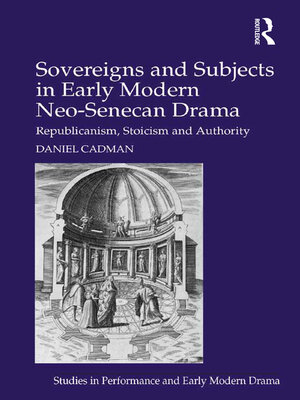Sovereigns and Subjects in Early Modern Neo-Senecan Drama
ebook ∣ Republicanism, Stoicism and Authority
By Daniel Cadman

Sign up to save your library
With an OverDrive account, you can save your favorite libraries for at-a-glance information about availability. Find out more about OverDrive accounts.
Find this title in Libby, the library reading app by OverDrive.



Search for a digital library with this title
Title found at these libraries:
| Library Name | Distance |
|---|---|
| Loading... |
Sovereigns and Subjects in Early Modern Neo-Senecan Drama examines the development of neo-Senecan drama, also known as 'closet drama', during the years 1590-1613. It is the first book-length study since 1924 to consider these plays - the dramatic works of Mary Sidney, Samuel Daniel, Samuel Brandon, Fulke Greville, Sir William Alexander, and Elizabeth Cary, along with the Roman tragedies of Ben Jonson and Thomas Kyd - as a coherent group. Daniel Cadman suggests these works interrogate the relations between sovereigns and subjects during the early modern period by engaging with the humanist discourses of republicanism and stoicism. Cadman argues that the texts under study probe various aspects of this dynamic and illuminate the ways in which stoicism and republicanism provide essential frameworks for negotiating this relationship between the marginalized courtier and the absolute sovereign. He demonstrates how aristocrats and courtiers, such as Sidney, Greville, Alexander, and Cary, were able to use the neo-Senecan form to consider aspects of their limited political agency under an absolute monarch, while others, such as Brandon and Daniel, respond to similarly marginalized positions within both political and patronage networks. In analyzing how these plays illuminate various aspects of early modern political culture, this book addresses several gaps in the scholarship of early modern drama and explores new contexts in relation to more familiar writers, as well as extending the critical debate to include hitherto neglected authors.







